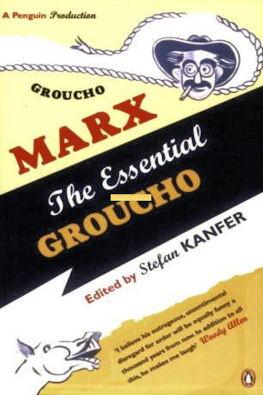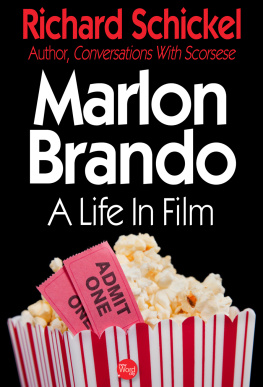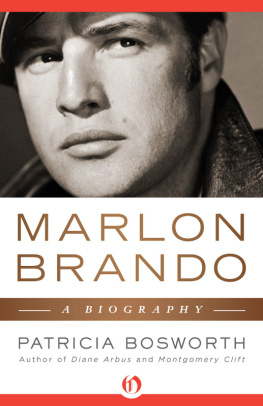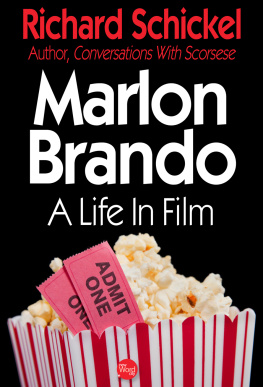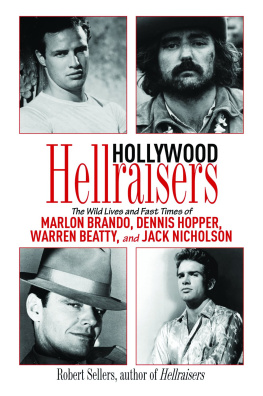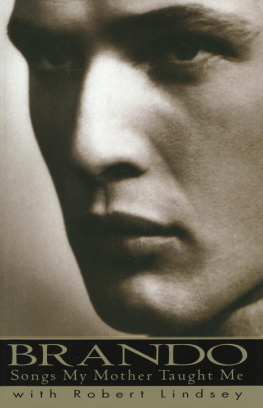Stefan Kanfer - Somebody: The Reckless Life and Remarkable Career of Marlon Brando
Here you can read online Stefan Kanfer - Somebody: The Reckless Life and Remarkable Career of Marlon Brando full text of the book (entire story) in english for free. Download pdf and epub, get meaning, cover and reviews about this ebook. year: 2008, publisher: Alfred A. Knopf, genre: Non-fiction. Description of the work, (preface) as well as reviews are available. Best literature library LitArk.com created for fans of good reading and offers a wide selection of genres:
Romance novel
Science fiction
Adventure
Detective
Science
History
Home and family
Prose
Art
Politics
Computer
Non-fiction
Religion
Business
Children
Humor
Choose a favorite category and find really read worthwhile books. Enjoy immersion in the world of imagination, feel the emotions of the characters or learn something new for yourself, make an fascinating discovery.

- Book:Somebody: The Reckless Life and Remarkable Career of Marlon Brando
- Author:
- Publisher:Alfred A. Knopf
- Genre:
- Year:2008
- Rating:3 / 5
- Favourites:Add to favourites
- Your mark:
- 60
- 1
- 2
- 3
- 4
- 5
Somebody: The Reckless Life and Remarkable Career of Marlon Brando: summary, description and annotation
We offer to read an annotation, description, summary or preface (depends on what the author of the book "Somebody: The Reckless Life and Remarkable Career of Marlon Brando" wrote himself). If you haven't found the necessary information about the book — write in the comments, we will try to find it.
Stefan Kanfer: author's other books
Who wrote Somebody: The Reckless Life and Remarkable Career of Marlon Brando? Find out the surname, the name of the author of the book and a list of all author's works by series.
Somebody: The Reckless Life and Remarkable Career of Marlon Brando — read online for free the complete book (whole text) full work
Below is the text of the book, divided by pages. System saving the place of the last page read, allows you to conveniently read the book "Somebody: The Reckless Life and Remarkable Career of Marlon Brando" online for free, without having to search again every time where you left off. Put a bookmark, and you can go to the page where you finished reading at any time.
Font size:
Interval:
Bookmark:
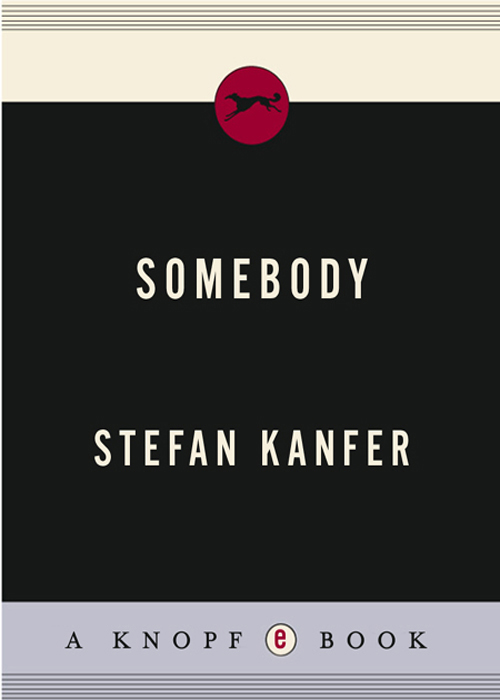
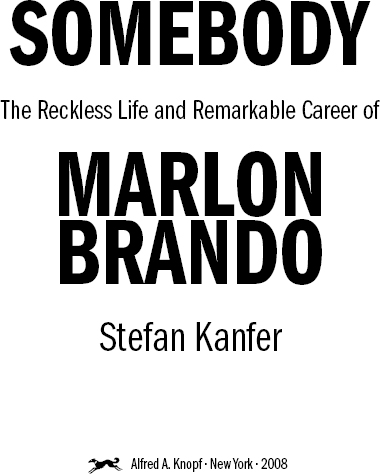
Contents
FOR LEA PAGE CASTLE AND ALYSSA TRUE CASTLE
Introduction
T o the end of his life, Marlon Brando insisted that he had done nothing special. In his view acting was a trade like plumbing or baking. The only difference was that he played characters instead of unclogging drains or kneading loaves of bread. This was not false modesty; he believed what he said. But what he believed was untrue.
There was screen acting before Brando and after Brando, just as there was painting before Picasso and after Picasso and writing before Hemingway and after Hemingway and popular singing before Sinatra and after Sinatra, and even the casual observer can tell the difference. As film historian Molly Haskell pointed out, the film stars legend is written in one word. BRANDO. Like Garbo. Or Fido. An animal, a force of nature, an element; not a human being who must, as a member of society, distinguish himself from other members with a Christian name and an initial as well as a surname. There is only one Brando.
The eminent screen stars of the 1930s and 1940sFredric March, Paul Muni, John Barrymore, Humphrey Bogart, Laurence Olivier, Spencer Tracywere careful to protect themselves even as they convinced audiences that they were taking risks. But from his debut film, The Men, in 1950, Brando worked without a mask. The inner wounds were manifest, and the risks he tookdoing anything, no matter how outlandish or unflattering, to make the character crediblehad never been attempted by a Hollywood star. His predecessors drew a line between their private lives and their movie roles. No such boundary existed between Brando the actor and Brando the man. They were one and the same: complicated, dangerous, vulnerable. That, too, was different.
From todays vantage point its difficult to gauge the impact of certain film personalities on their time. In 1940 Howard Hawks made full use of overlapping dialogue for His Girl Friday; his style has been co-opted so often it has lost its power to electrify an audience. In 1960, ticket buyers were jarred and dislocated when Alfred Hitchcock killed off his star, Janet Leigh, halfway through Psycho; his device has since become commonplace. Similarly, when Brando first appeared, he shook up screen acting in a way that had not been seen since performers were given voices in 1927. His work has been sedulously imitated by performers for more than half a century. Those actors have unwittingly obscured the contributions of the man who started it all.
Anthony Quinn once described the cinema of the early 1950s: Everything was proper. Robert Taylor, Tyrone Power, Van Johnson, and along comes Brando. Marlon was the first to show a profound vulnerability beneath the male exterior, as well as a willingness to depart from the script not out of perversity or an inability to remember lines, but because he was going for the truth of the character at that moment. Along comes Brando, and an art form is transfigured.
Many factors contributed to Marlons achievement. He appeared on the scene at just the right time, he was launched by one of the twentieth centurys central stage dramas, and he was trained by one of the most influential acting teachers of all time, the Yiddish-theater veteran Stella Adler. Some of the attraction he held for herand later for the worldwas a physical presence that echoed the animal magnetism and raw intellect of her father, Jacob, a Second Avenue luminary. This was combined with a quality displayed by Boris Thomashefsky, Jacobs greatest competitor. In a memoir, Adlers granddaughter noted that Boriss overwhelming masculinity was balanced by a softness even more dangerous. His well-known susceptibility crossed the footlights with fatal impact. He was, in fact, a personality impossible to resist. She could have been writing about Marlon Brando when he entered stage left two generations later.
Brandos genius, like that of so many other groundbreaking artists, was mixed with immense character flaws that stained his personal and professional relationships. So disorderly was his private life that an entire book, Brando Unzipped, is scurrilously devoted to his numerous affairs, liaisons, and marriages. Many other biographies are little more than clothbound gossip columns, or tell-all narratives by onetime associates hoping to cash in on an old professional or social connection.
These salacious accounts make lively reading. But they have little to do with Marlon Brandos artistic achievement. Indeed, they tend to reduce his reputation by portraying him as a strutting phallus who happened to make a few good movies when he was not otherwise engaged. Part of this can be directly traced to the actors contemptuous self-appraisals. In Conversations with Brando, Lawrence Grobel records the following exchange:
GROBEL: What about acting as an art form?
BRANDO: In your heart of hearts you know perfectly well that movie stars arent artists.
GROBEL: Are any people in your profession artists?
BRANDO: No.
GROBEL: None at all?
BRANDO: Not one.
On other occasions Marlon added to those remarks. Advice to himself: Never confuse the size of your paycheck with the size of your talent. To his fellow performers: Acting is an illusion, a form of histrionic sleight of handits a bums life. The principal benefit acting has afforded me is the money to pay for my psychoanalysis. That response was not as blithe as it sounded. Brandos early years disfigured the rest of his life. He never fully emerged from the shadows of a cold and brutal father and a longing, desperately unhappy mother who squandered the best hours of her best years in an alcoholic haze. From the actors childhood through adolescence, Marlon Brando, Sr., repeatedly told his only son he would amount to nothing. Although Marlon junior proved his father wrong over and over again, the damage had been done. No material success, no critical praise, no financial reward ever served to assuage the wounds Marlon suffered before he could defend himself. Ironically, they were also what gave him such persuasive strength as a performer.
Few of Brandos contemporaries bought his line of self-denigration. Marlons work was so beautiful and so pure, said Julie Harris, his costar in Reflections in a Golden Eye. There was no explaining where it came from. He didnt respect acting, but his gift was so great he couldnt defile it. He could put on pounds, he could say it was all shit, but he still couldnt destroy it.
Director Harold Clurman, the husband of Brandos acting coach and mentor, Stella Adler, believed that the disrespect was not a pose. He noted, [There is] something in Marlon that resents acting, yet he cannot help but be an actor. He thinks acting sickly. Hed rather do something for the world.
Clurman underlined another irony in Brandos career. Because Marlon could so completely lose himself in a role, he was convinced that he could feel the wounds of a disenfranchised black, an oppressed Native American, a vagrant, a bewildered homosexual, a palooka. But the offscreen efforts he made on their behalf had no lasting effect. Acting, much as Marlon resisted it, was the one place where he could give voice to the powerless.
The trouble was, Brandos gift came with a price tag. He was like some cursed figure from folklore who might have anything he wantedfame, riches, beautiful women, powerprovided that he couldnt enjoy it. Immensely attractive to both sexes, he seemed in charge of any and all affairs. But he abandoned all three wives and numerous lovers, often in fear that they would abandon him first. He loved his eleven children, but never knew how to relate to them once they entered adolescencea shortcoming that would have fatal consequences. At the top of the heap in Hollywood, he called the whole thing a sham and became difficult (and sometimes impossible) for directors and writers to deal with. When this misbehavior was forgiven or overlooked, he deliberately slid downhill to a pile of trash, movies that lost money and nearly wrecked him as an actor. The more beguiling his appearance, the less comfortable he was with it, finally distancing himself from his admirers by putting on weight until he grew morbidly obese. This nearly wrecked him as a man.
Next pageFont size:
Interval:
Bookmark:
Similar books «Somebody: The Reckless Life and Remarkable Career of Marlon Brando»
Look at similar books to Somebody: The Reckless Life and Remarkable Career of Marlon Brando. We have selected literature similar in name and meaning in the hope of providing readers with more options to find new, interesting, not yet read works.
Discussion, reviews of the book Somebody: The Reckless Life and Remarkable Career of Marlon Brando and just readers' own opinions. Leave your comments, write what you think about the work, its meaning or the main characters. Specify what exactly you liked and what you didn't like, and why you think so.

